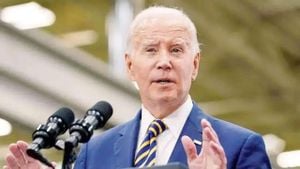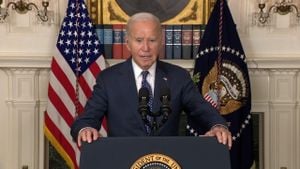California continues its efforts to promote inclusivity and respect for Native American communities by launching the removal of the derogatory term "squaw" from over 30 geographic locations across the state. The term has long been regarded as disrespectful and offensive, particularly toward Indigenous women, and its usage has been officially criticized by various governmental entities. The California Natural Resources Agency announced this landmark decision, set to be implemented by January 1, 2025, aligning with the values of respect and acknowledgment of historical injustices toward Native American tribes.
The word "squaw" has been part of geographic names across California for decades. Currently, it appears on places including parks, streets, bridges, and buildings across 15 counties. This move to remove the term not only reflects changing attitudes toward language and representation but significantly marks progress toward healing relationships with Indigenous populations. Under California’s Assembly Bill 2022, enacted by Governor Gavin Newsom, local governments have until early 2025 to select new names for the affected sites.
Wade Crowfoot, Secretary of the California Natural Resources Agency, emphasized the importance of this change, stating, "The names we give to places in California reflect our shared history and culture. These place names should never insult communities or perpetuate discrimination." He elaborated on the agency’s commitment to correcting the historic wrongs faced by California's Native American communities.
The decision to eliminate "squaw" from place names follows the 2021 announcement by the U.S. Department of the Interior, which officially recognized the term as derogatory. Since then, efforts have surged to rename numerous geographic features across federal lands, where over 660 places have been identified for renaming as part of this effort. California is not alone; many states have initiated similar measures to rid public conversation of historically loaded language.
Among the locations included on California’s removal list are notable places such as cemeteries, schools, and even areas designated for forestry management. The California Department of Forestry and Fire Protection is addressing name changes for several fire stations as part of the initiative. The collaborative effort involves consultation with local tribes to choose more culturally appropriate alternatives, the importance of which cannot be overstated. Even newly proposed names are rooted deeply within tribal heritage and language.
Significantly, some locations have already undergone successful rebranding and renaming. For example, the popular ski resort at Lake Tahoe, previously known for its derogatory name, has transitioned to the more respectful "Palisades Tahoe," which highlights both its geographical features and honors the region’s history without derogatory undertones.
Active tribal leaders, including Anthony Roberts of the Yocha Dehe Wintun Nation, have voiced their support for these changes. They stress the need for continued consultation with Tribal councils to respectfully guide and lead this important initiative: “With continued consultation, tribes can lead initiatives to eliminate such words from California's public places,” Roberts said.
The effort to remove racially charged language from public and geographic naming is indicative of broader societal shifts toward inclusivity and acknowledgment of past injustices. This point resonates deeply, as many Native American leaders have expressed. The push for renaming is not merely symbolic, but rather part of extensive efforts to recognize and affirm the dignity of Indigenous peoples. Geneva Thompson, Deputy Secretary for Tribal Affairs at the Natural Resources Agency, remarked on the significance of this initiative and how recognition of historical wrongs can lead to healing processes.
"Acknowledging those historical wrongs committed against Native Americans is extremely important, but we need to take the next step toward healing," Thompson mentioned. Such sentiments reflect the broader cultural recognition of the systemic issues Indigenous communities face, echoing calls from activists for more concrete steps beyond language changes. The objectives extend to building communities centered on respect and mutual recognition.
Alongside governmental backing, communities have increasingly become engaged with these discussions, highlighting the importance of recognizing the contributions and histories of native groups. The change creates space not only for more accurate representations of geographical aspects but also for broader discussions about historical narratives and reconciliation.
Looking forward, California’s initiative is expected to instigate similar actions in other states, as the issue surrounding derogatory geographic names is gaining attention nationwide. The dynamic atmosphere surrounding language around public naming is increasingly being seen as reflective of larger societal values and relationships with Indigenous peoples.
The movement to eliminate the term "squaw" holds broad significance beyond California’s borders, challenging other states to reflect on their own narratives and representations. It marks another step toward creating more inclusive communities—where names reflect respect and acknowledgment, rather than historical prejudices. Continued dialogue and collaboration with Indigenous leaders will remain key as changes take effect. The social fabric of California stands to benefit from such transformations, fostering greater harmony and shared pride among its diverse population.



